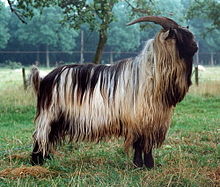Dutch Landrace goat
 | |
| Conservation status | |
|---|---|
| Other names | |
| Country of origin | The Netherlands |
| Distribution | The Netherlands |
| Standard | Landelijke Fokkersclub Nederlandse Landgeiten (in Dutch) |
| Traits | |
| Weight | |
| Height | |
| Coat |
|
| Horn status | lyre-shaped, scimitar or twisted; may reach 100 cm in length[3]: 376 |
| Beard | yes |
| |


The Dutch Landrace is a traditional Dutch breed of domestic goat. It has been known in the Netherlands since the seventeenth century,[3]: 376 and was formerly numerous there. It came close to extinction in the 1950s, but was saved by cross-breeding with unrelated goats, and by 2020 numbered over 2000 head.[2][4]
History
[edit]The Dutch Landrace has been known in the Netherlands since the seventeenth century,[3]: 376 and was common until the early twentieth century, when Swiss Saanen and Toggenburg goats were imported in large numbers and cross-bred with local stock. By 1958 only one pair of the goats remained, and attempts to find others were unsuccessful. Because the descendants of these two goats were heavily inbred, the decision was taken to cross-breed them with a number of unrelated goats.[4] Numbers grew, and by 2020 there were some 2000 nannies and 200 billies.[5]
A breed association, the Landelijke Fokkersclub Nederlandse Landgeiten, was formed in 1982.[3]: 376 [6]: 137
Characteristics
[edit]The Dutch Landrace is stocky and of medium size, with fairly short legs. It may be of any colour but may not display Swiss markings; it is commonly black, blue, brown, grey, white or "wild-coloured".[3]: 376 The coat is usually long and rough, but may also be short.[5] The horns are commonly lyre-shaped, scimitar-shaped or twisted, and may reach 100 cm in length.[3]: 376
References
[edit]- ^ Barbara Rischkowsky, D. Pilling (eds.) (2007). List of breeds documented in the Global Databank for Animal Genetic Resources, annex to The State of the World's Animal Genetic Resources for Food and Agriculture. Rome: Food and Agriculture Organization of the United Nations. ISBN 9789251057629. Accessed January 2017.
- ^ a b c d e f Breed data sheet: Nederlandse Landgeit / Netherlands (Goat). Domestic Animal Diversity Information System of the Food and Agriculture Organization of the United Nations. Accessed April 2020.
- ^ a b c d e f g Valerie Porter, Lawrence Alderson, Stephen J.G. Hall, D. Phillip Sponenberg (2016). Mason's World Encyclopedia of Livestock Breeds and Breeding (sixth edition). Wallingford: CABI. ISBN 9781780647944.
- ^ a b Historie (in Dutch). Landelijke Fokkersclub Nederlandse Landgeiten. Accessed April 2020.
- ^ a b Fokken: Rasstandaard (in Dutch). Landelijke Fokkersclub Nederlandse Landgeiten. Accessed April 2020.
- ^ Valerie Porter, Ian Lauder Mason (2002). Mason's World Dictionary of Livestock Breeds, Types, and Varieties (fifth edition). Wallingford: CABI. ISBN 085199430X.
